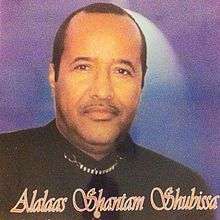Shantam Shubissa
Shantam Shubissa (born Mohamed Ibrahim Waday; December 25, 1949) is an Ethiopian composer, singer and poet.[1] He was born in Dire Dawa, Ethiopia. Along with musicians such as Ali Birra, Shantam Shubissa is regarded one of Oromian significant contributors to music during the late 20th century [2]
Shantam Shubissa | |
|---|---|
 | |
| Background information | |
| Birth name | Mohamed Ibrahim Waday |
| Born | December 25, 1949 Magaala Xiqqoo, Dire Dawa, Ethiopia |
| Genres |
|
| Years active | 1968–present |
The stage name "Shantam" means "fifty". It was given after Shantam released a song where he composed the same chorus in five different languages: Arabic, Oromo, Somali, Amharic and Harari . The word Shan is "five" morphed into Shantam to fifty. The surname Shubissa means "dance" and was added later. Together, his name is translated as "fifty dancer.
Musical career
Shantam released many songs ranging from a variety of topics including love, nature and revolutionary politics. Although he has not released an official collection of poetry, his most famed classic songs[3] include: "Alaaba Nagayaa", (Banner of Peace), "Naaf si uume" (You were created for me), "Yaa Quburee" (Hey Gorgeous), and "Yaa haadha too" (My mother).[2]
Awards
In 1995, Shantam was awarded for his contributions by the Oromo Radio Committee in Melbourne, Australia.[4] He also received recognition for contribution to language and culture,[5] a lifetime contribution to music and arts award in Melbourne, Australia; 2000 and was officially invited back to Africa, after decades in exile.,[2] as a special guest to open the Oromo Cultural Centre in Adama, Oromia in 2006. Shantam also toured United States, Canada and Germany numerous times, singing to Oromo people living outside his native country.[6]
References
- Gow, Greg (2002). The Oromo in exile: from the Horn of Africa to the suburbs of Australia - Greg Gow - Google Books. ISBN 9780522849905. Retrieved 2013-09-15.
- "Timeless Afan Oromo song by shantam Shubisa (Sin Jaladhaa)". YouTube. 2012-05-20. Retrieved 2013-09-15.
- https://web.archive.org/web/20110607033852/http://www.oromocommunity.org.au/radio.html. Archived from the original on June 7, 2011. Retrieved January 4, 2013. Missing or empty
|title=(help) - "Oromo Radio Program – OROMOCENTRE". Oromocentre.org. Archived from the original on 2013-12-08. Retrieved 2013-09-15.
- "Afran Qallo band marks 50 years of making music and history | Horn of Africa | News". Opride.com. 2012-06-28. Retrieved 2013-09-15.